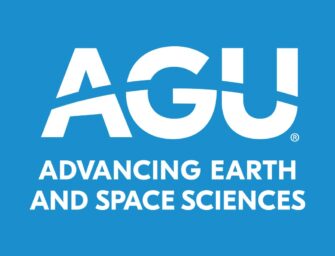NSF grant takes AGU’s data and publishing practices to the next level
I’m proud to announce AGU has received funding from the National Science Foundation (NSF) building on our work around open data sharing in the Earth, space and environmental sciences. Under this grant, AGU, working with several key partners, will further these data practices and help ensure that NSF Earth science data are publicly accessible, linked to publications and grants, and credited. This work will serve as a model for linking information across funders, data repositories and publishers, and improving public access to research outputs. All knowledge and practices will be openly shared.
AGU has been working with hundreds of repositories, publishers, and other partners across the international data and geoscience community to adopt and implement the Enabling FAIR Data Commitment Statement. Under this commitment publishers, repositories, researchers and others have agreed to adopt a set of best practices around data and software sharing, use of appropriate, trusted repositories and including citations in papers. Data and software citations allow for automated linking to the paper, author and funder, and supports credit to the creator.
Helping researchers and authors receive credit for their data and link to their research and funder is the primary goal of this grant. AGU journals, working with our partners, will focus on improving the workflow to properly manage and track data and software references throughout the publication pipeline. This NSF funding will allow AGU to hire a new staff member in data stewardship, to further develop best practices, serve as a resource to AGU editors, reviewers and authors, and support the implementation of AGU’s updated data and software publication policies. AGU’s publishing partner Wiley will ensure that data citations are preserved through publication and online indexing.
Earth Science Information Partners (ESIP), an international community of more than 150 organizations with significant collective data stewardship expertise, will support this project’s outreach efforts through the AGU/ESIP Data FAIRs, especially the Data Help Desks at society meetings and through the ESIP-hosted Coalition for Publishing Data in the Earth and Space Sciences (COPDESS.org), an emerging community space for data repositories and journals to work together.
This is an important project because too often, the data underlying published studies is difficult to find or access, which can hinder new scientific research. Currently, only about 20% of published papers have their supporting data in discoverable and accessible repositories.
Through this grant, we have partnered with Dryad, a not-for-profit multidisciplinary repository that houses research data that do not otherwise have a disciplinary home. Dryad provides consistent curation, preservation and discovery features, and NSF-supported authors publishing in AGU journals will have their associated data publishing and curation costs covered.
This grant supports a larger effort at NSF expanding the NSF Public Access Repository (NSF PAR) to now include datasets. Through AGU’s partner CHORUS, a not-for-profit organization that monitors open access, preservation and compliance to scholarly content and data reporting on funded research, we will track the outputs of this project and provide links between datasets, grants, author profiles and published articles back to PAR for widespread adoption in the future. AGU is proud to initiate procedures within our publishing program to help achieve NSF’s overarching goal.
The Principal Investigator for the grant (NSF 2025364) is Brooks Hanson, AGU’s Executive Vice President for Science. The work is supported by Shelley Stall as the Project Manager, Senior Director for AGU Data Leadership and the AGU publications team led by Matt Giampoala, Vice President of Publications.
Be sure to visit the #AGUDataFAIR and #DataHelpDesk at #AGU20. We hope to see you there.



[…] NSF grant takes AGU’s data and publishing practices to the next level – October 23, 2020 […]